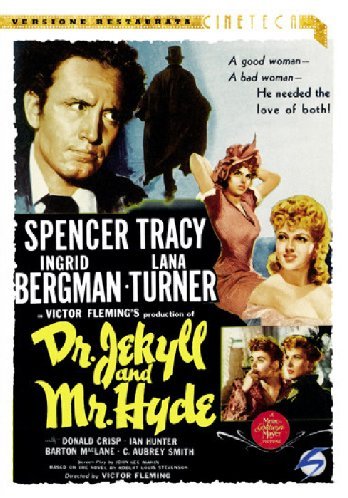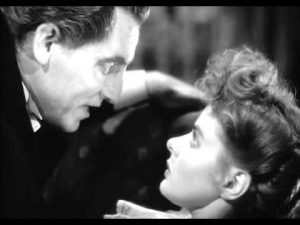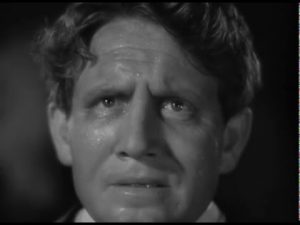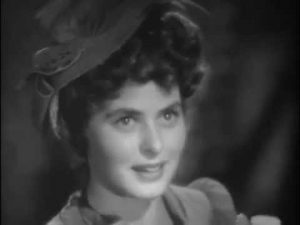Dr Jekyll and Mr. Hyde (1941) starring Spencer Tracy, Ingrid Bergman, Lana Turner
If there’s a problem with the 1941 version of Robert Louis Stevenson’s classic tale of a man split between his dark and light sides, Dr. Jekyll and Mr. Hyde, it unfortunately comes down to the lead actor, Spencer Tracy. It’s undeniable that Spencer Tracy is a fine actor but not in this film. He portrays Dr. Henry Jekyll as nearly neutral and spineless, and he plays Mr. Hyde not as a wild, unhindered, lover of self, but as a slightly more menacing version of Dr. Jekyll. When he starts a bar fight he doesn’t participate. When he abuses the lovely singer Ivy (Ingrid Bergman) its barely what most people would consider anger.
Outside of Spencer Tracy, I do want to mention the performance of the other characters
- Ingrid Bergman does a very good job as the abused singer, Ivy Peterson; her performance makes the movie worth watching.
- Donald Crisp does a good job as her protective father who is eventually murdered by Hyde.
- Lana Turner does an adequate job as Jekyll’s fiancee, Beatrix Emery. That’s not an insult against Lana Turner; the script simply doesn’t give her much to do.
- C. Aubrey Smith has a minor role as the bishop, who appears in a scene at church early in the film, leading to Jekyll’s consideration of the good and evil nature of man, and later on as a guest at a dinner party
Frankly, the following quote shows what I consider to be the largest flaw in the movie:
Dr. Henry Jekyll: [as Hyde] When you went to see the good doctor, before you left you said I almost thought, well what did you think? Maybe that you saw a little bit of ME, Hyde in him?
There’s little difference in this film between Jekyll and Hyde either in physical appearance or how they act. The idea that Spencer Tracys Hyde is unrecognizable as Jekyll is simply laughable. According to the Internet Movie Database, Spencer Tracy’s appearance as Mr. Hyde was disguised in cinema trailers for fear that audiences would laugh at it. I totally agree. Spencer Tracy feared that this role would end his career with good reason. Spencer Tracy considered this to be his least favorite role and I agree with him. If you get the impression that I’m not a fan of the 1941 version of Dr. Jekyll and Mr. Hyde, you’re quite right. I rate it 1.5 stars out of 5.
Editorial review of Dr. Jekyll and Mr. Hyde (1941)
Classy MGM was not the studio most likely to make a horror movie in 1941, and in fact its production of Dr. Jekyll and Mr. Hyde ended up looking more like a glossy costume drama than a B-movie frightfest. The mood of Robert Louis Stevenson’s tale of a divided doctor is ably captured in Joseph Ruttenbergs Oscar-nominated cinematography more so, perhaps, than in Spencer Tracy’s lead performance. Tracy wasn’t especially happy about playing the role, although his transformations from good Dr. Jekyll to evil Dr. Hyde are convincing enough.
One of the main reasons to see this version of the story is the young, impossibly beautiful Ingrid Bergman, then still a year shy of Casablanca. Bergman was cast in the good-girl part, but proved a shrewd judge of material, even this early in her Hollywood career; she finagled her way into playing the floozy instead, thus securing a more colorful acting platform than Lana Turner, who ended up in the more respectable role. Director Victor Flemings previous movie was a little number called Gone with the Wind, and the Big Picture approach to that project may have influenced his work here this Dr. Jekyll is just a bit too stately, too polished to really engage.
The picture is so dignified it never cuts loose with the kind of wild invention that marked the 1932 version of the story, which won Fredric March an Oscar. It’s the tale as imagined by Jekyll, rather than Hyde. Robert Horton




